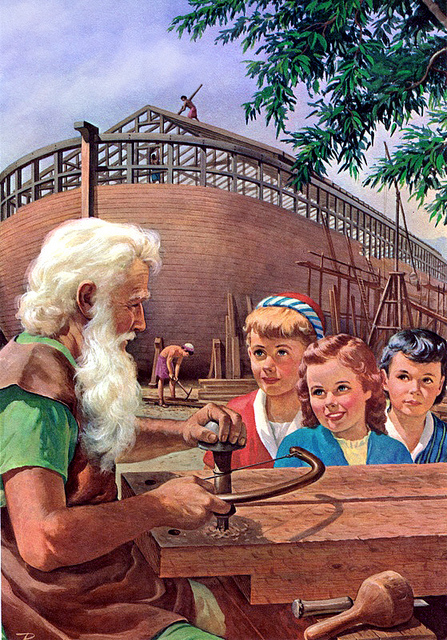
A kindly Noah talking to some white children from the 1950s who time-traveled to him. Photo by Waiting for the Word via Flickr (http://bit.ly/1cqz57E)
It’s a good thing stories of drunkenness, incest, adultery, and bizarre tales of bears killing children for making fun of a bald prophet never made it into the Bible. Can you imagine what a mess that would be? I, for one, am glad for this whitewashed and easy-to-interpret book.
Darren Aronofsky (director of such lighthearted family fare as Black Swan, Pi, and Requiem for a Dream) is working on a new film about the Biblical character of Noah. You remember Noah — he was the guy who turned away the unicorns from the ark because they were late. He had a long beard and a brown robe and a friendly smile, kind of like Russell Crowe, who plays Noah in the film.
Paramount, nervous about how faith-based audiences would respond to the film (set to be released March 28), held test screenings with Christian audiences. The Hollywood Reporter wrote about the audience reaction:
“Friction grew when a segment of the recruited Christian viewers, among whom the studio had hoped to find Noah‘s most enthusiastic fans, questioned the film’s adherence to the Bible story and reacted negatively to the intensity and darkness of the lead character. Aronofsky’s Noah gets drunk, for example, and considers taking drastic measures to eradicate mankind from the planet.”
And therein lies the problem. When we expect whitewashed versions of what is actually in the Bible, we will be sorely disappointed by the real thing. In case it’s been a while since you’ve read Genesis 9, take a moment to refresh your memory of what the Bible says about Noah:
“Noah, a man of the soil, was the first to plant a vineyard. He drank some of the wine and became drunk, and he lay uncovered in his tent. And Ham, the father of Canaan, saw the nakedness of his father, and told his two brothers…when Noah awoke from his wine and knew what his youngest son had done to him, he said, “Cursed be Canaan; lowest of slaves shall he be to his brothers.”
(Not incidentally, this passage was used by Christians in the antebellum south for decades, if not centuries, to justify slavery.)
So Noah got drunk and cursed his son for failing to honor his privacy and dignity. Noah was also “a righteous man, blameless in his generation; Noah walked with God.” (Genesis 6:9) This is the mystery of the Scriptures: both of these things are somehow true. Noah was righteous and he got super drunk and laid naked in his tent. As Rebecca Cusey wrote at Patheos, “If you associate the story of Noah with adorable animals smiling under a sunny rainbow, you’re reading the story wrong.”
One of my own early forays into understanding the origins of the world came about when my Old Testament professor at my (wonderful, very Christian) college mentioned how many Ancient Near Eastern origin accounts — some of which predated Genesis — had some kind of flood narrative as their starting point. The epic of Gilgamesh, for example, in which the god Ea commanded Utnapishtim to build a ship to survive the flood.
There is a great deal to struggle with in these early texts, and a great deal that is hard to understand. What we need to remember is to take the Scriptures for what they are without imposing some sort of Disney filter to them. Noah may not be the film you want to take your young children to see, and that’s no problem. But let’s not pretend that the Bible is all nice people and happy endings. We who call ourselves religious, of all people, should know better.




